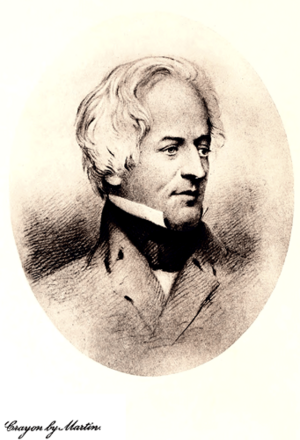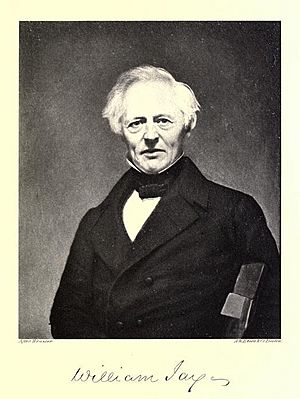William Jay (jurist) facts for kids
Quick facts for kids
William Jay
|
|
|---|---|
 |
|
| Born | 16 June 1789 |
| Died | 14 October 1858 (aged 69) Bedford, New York, U.S.
|
| Alma mater | Yale College |
| Occupation | Judge |
| Spouse(s) |
Augusta McVickar
(m. 1812; |
| Children | 8, including John Jay (lawyer) |
| Parent(s) | John Jay Sarah Livingston Jay |
| Relatives | William Livingston (grandfather) Charles Pellew, 7th Viscount Exmouth (grandson) |
| Signature | |
William Jay (born June 16, 1789 – died October 14, 1858) was an American abolitionist and judge. He worked to end slavery and promote peace. William Jay was the son of John Jay, who was a Governor of New York and the first Chief Justice of the U.S. Supreme Court.
Contents
Early Life and Education
William Jay was born in New York City on June 16, 1789. His father was John Jay and his mother was Sarah Livingston Jay. William had several older brothers and sisters.
His grandfather, William Livingston, was an important lawyer. He signed the Constitution of the United States and became the first Governor of New Jersey after the American Revolutionary War.
William Jay went to Yale College and graduated in 1808.
A Career in Law and Reform
After college, William Jay helped manage his father's large property in Westchester County, New York. He also studied law. However, his poor eyesight made it hard for him to continue working as a lawyer.
Instead, he became very interested in helping others. He supported movements that worked for social change. He was especially involved in efforts to stop slavery, promote temperance (reducing alcohol use), and encourage peace.
Working for Change
In 1816, William Jay helped start the American Bible Society. This group worked to spread the Bible. He defended the society when it faced criticism.
He also served as a judge. From 1818 to 1820, he was a Judge of Common Pleas in New York. Then, from 1820 to 1842, he was the first judge of Westchester County. He lost this job because of his strong views against slavery.
Fighting Against Slavery
William Jay was a dedicated member of the American Anti-Slavery Society. He even helped write their rules. He was known as a calm and logical voice among those who wanted to end slavery. His writings had a big impact for many years.
From 1835 to 1837, he was the society's foreign secretary. This meant he handled their international communications. In 1840, he left the society because he felt some of their new ideas were too extreme. However, he continued to write and work to end slavery. He pushed for slavery to be banned in Washington, D.C. and in new territories joining the country.
Promoting Peace
William Jay also believed strongly in peace. For many years, he was the president of the New York Peace Society. He wrote a famous pamphlet called War and Peace: the Evils of the First with a Plan for Securing the Last. In this writing, he suggested that countries should try to solve their problems through international arbitration. This means having a neutral third party help them find a solution instead of going to war.
His ideas were very influential. It is believed that his work helped lead to a special agreement in the Treaty of Paris in 1856. This agreement encouraged nations to seek help from a friendly country before starting a war.
Family Life
In 1812, William Jay married Augusta McVickar. They had eight children together. Six of their children lived to adulthood.
Their children included:
- Augusta Jay, who married John Nelson.
- Maria Banyer Jay, who married John F. Butterworth.
- John Jay (1817–1894), who became a U.S. Minister to Austria-Hungary.
- Sarah Louisa Jay, who married Dr. Alexander M. Bruen.
- Eliza Constable Jay, who married Henry Pellew, 6th Viscount Exmouth.
- Augusta Jay, who later married Henry Edward Pellew after her sister Eliza passed away.
William Jay passed away at his home in Bedford, New York, on October 14, 1858. His grandson, Charles Pellew, 7th Viscount Exmouth, became a chemistry professor at Columbia University.
His Legacy
Many people respected William Jay for his important work. Frederick Douglass, a famous abolitionist, called him "our wise counsellor, our fine friend, and our liberal benefactor." Lewis Tappan, another abolitionist leader, said that William Jay had done more for the cause of ending slavery than almost anyone else through his writings and actions.
 | Isaac Myers |
 | D. Hamilton Jackson |
 | A. Philip Randolph |


